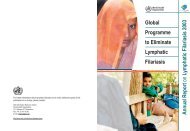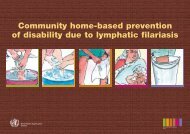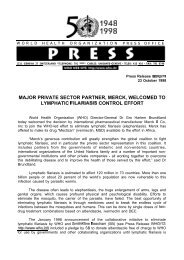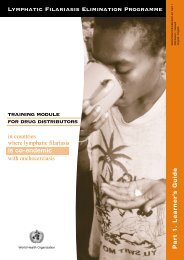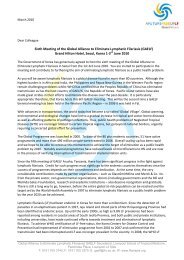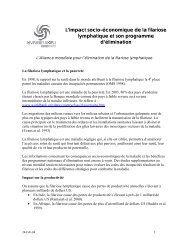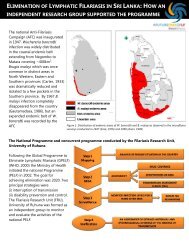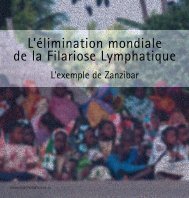English - Global Alliance to Eliminate Lymphatic Filariasis
English - Global Alliance to Eliminate Lymphatic Filariasis
English - Global Alliance to Eliminate Lymphatic Filariasis
Create successful ePaper yourself
Turn your PDF publications into a flip-book with our unique Google optimized e-Paper software.
REPORT OF THE 6 TH GAELF MEETING, JUNE 2010<br />
Half-time Score in Morbidity<br />
Control<br />
Chair: Professor Da<strong>to</strong> C.P. Ramachandran<br />
Impact of MDA on Clinical Disease<br />
Professor Charles Mackenzie, Professor of<br />
Parasi<strong>to</strong>logy and Diagnostic Investigation<br />
at Michigan State<br />
University, observed<br />
that accurate data are<br />
not available on the<br />
number of people<br />
affected with various<br />
forms of LF-related<br />
disease, and this<br />
limits our capacity <strong>to</strong><br />
plan for and provide<br />
adequate care.<br />
Since it began in 2000, the GAELF has<br />
learned about the impact of MDA on<br />
clinical disease. Data from Tanzania<br />
indicate that MDA dramatically reduces<br />
the incidence of new cases of clinical<br />
disease. Dr Mackenzie argued that the<br />
incidence of clinical disease may be a<br />
critically important indica<strong>to</strong>r of<br />
programme success. In Tanzania, MDA has<br />
been associated with reduced incidence,<br />
duration, and severity of ADL in persons<br />
with chronic morbidity. Studies by<br />
Professor RK Shenoy, in<br />
India, also indicate that<br />
antifilarial drug<br />
treatment has an effect<br />
on sub-clinical disease<br />
in children (see below).<br />
As the GAELF enters<br />
the next decade, Dr<br />
Mackenzie called for a<br />
clearer understanding of the extent and<br />
magnitude of clinical LF; more effective<br />
treatment, including improved wound and<br />
surgical care; and more widespread<br />
patient support systems,<br />
which have been piloted<br />
in Brazil, India, Tanzania,<br />
and elsewhere. He argued<br />
for improved funding and<br />
technical support for<br />
morbidity management,<br />
especially for specific<br />
patient needs, such as<br />
specialized shoes;<br />
assistance in job development and reentry<br />
in<strong>to</strong> the commercial community;<br />
psychological support; and comprehensive<br />
care packages. He stressed the need for<br />
more widespread innovation, such as the<br />
President Kikwete Fund, which supports<br />
hydrocele surgery in Tanzania.<br />
Prevention of Lymphoedema in Children<br />
Professor RK Shenoy, Chief of the <strong>Filariasis</strong><br />
Research Unit at TD Medical College in<br />
Kerala, India described a study that he and<br />
his colleagues recently completed [5]. The<br />
study addressed the<br />
degree <strong>to</strong> which<br />
antifilarial drug<br />
treatment reverses<br />
clinical and sub-clinical<br />
disease associated with<br />
Brugia malayi infection<br />
in children 3-15 years<br />
old.<br />
27



